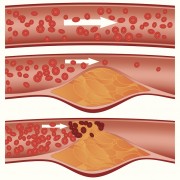Treating chronic total occlusions
Chronic total occlusions - a complete obstructions of the arteries are a serious condition that requires prompt diagnosis and treatment

A chronic total occlusion (CTO) is a complete blockage of a coronary artery that has been present for at least three months. The cause is a build-up of fatty material, like cholesterol and calcium, which significantly limits blood flow to the cardiac muscle.
Patients with CTO may experience several symptoms such as chest pain, shortness of breath, rapid or irregular heartbeat and heart attack.
Risk factors for a CTO includes a family history of heart disease, smoking, high cholesterol levels, an inactive lifestyle, and diabetes.
Diagnosing a chronic total occlusion (CTO)
There are a variety of tests that are instrumental in diagnosing a CTO.
A stress echocardiogram (ECG) is one common examination whose results may indicate the presence of a CTO. The test involves taking ultrasound images of the heart both before and after a patient exercises on a treadmill or stationary bike.
“If there is some narrowing of the artery, we will find that the heart cannot beat properly because it is under stress,” says Dr Tan Chong Hiok, a cardiologist at Mount Elizabeth Hospital in Singapore. During physical activity the heart is required to pump an increased amount of blood and ultrasound images can show whether the cardiac muscle is able to achieve this.
“If the patient cannot exercise because of an injury, like knee pain, cardiologists can do a dobutamine stress echocardiogram,” adds Dr Tan. This involves the administration of medication, in place of the treadmill or stationary bike, to increase the patient’s heart rate.
To have an even clearer picture of potential blockages, doctors can also request tests that are based on X-rays, such as a CT scan or a coronary angiogram.
Treatment options for patients with blockages in the coronary arteries
Traditionally, coronary artery bypass graft (CABG) surgery has been the treatment of choice for patients with a CTO. The surgery aims to bypass the blocked section of the artery by using a healthy blood vessel that re-routes blood flow around the obstruction.
This is major surgery, however, and requires a large incision in the chest along with the temporary stopping of the heart.
“Many patients with CTOs who have been advised to undergo CABG surgery don’t want to do a big surgery,” says Dr Tan. “That’s the time when they come to see me for an alternative treatment.”
He usually offers patients the chance to undergo a less invasive operation – the retrograde interventional procedure. This is carried out by inserting a small tube in the blood vessels that are collateral to the blocked artery so as to guide a tiny balloon as far as the blockage; once the balloon reaches the obstruction it is inflated to clear the build-up that prevents the blood from flowing. No incision in the chest is thus required.
Considering that not every cardiologist can perform a retrograde procedure, Dr Tan recommends that patients with a CTO do thorough research before agreeing to undergo a CABG procedure.
“If one doctor tells you that the retrograde procedure cannot be done, it doesn't necessarily mean that it really cannot be done,” he says. “You may find cardiologists who can do it, so it is worthwhile to seek a second opinion.”
 Dr Tan Chong Hiok is an interventional cardiologist and accredited echocardiologist at Mount Elizabeth Hospital in Singapore. He has extensive experience in performing stenting of the left main artery and treating chronic total occlusions and is one of the very few cardiologists in Singapore who have opened up totally blocked arteries using the retrograde approach.
Dr Tan Chong Hiok is an interventional cardiologist and accredited echocardiologist at Mount Elizabeth Hospital in Singapore. He has extensive experience in performing stenting of the left main artery and treating chronic total occlusions and is one of the very few cardiologists in Singapore who have opened up totally blocked arteries using the retrograde approach.
Mount Elizabeth Hospital
3 Mount Elizabeth, Singapore 228510
Tel: (+65) 6735 5000
www.mountelizabeth.com.sg
Cardiac Specialist Centre
Mount Elizabeth Medical Centre #16-07
3 Mount Elizabeth, Singapore 228510
Tel: (+65) 6887 3422
Related Articles
Why laughter may not be the best medicine
Dr Julian K.B. Tan, an interventional cardiologist at Mount Elizabeth Hospital, explains the how strong emotions may affect the heart
Read moreWhat is a heart attack?
Dr Paul Chiam discusses the importance of seeking treatment quickly in the case of a heart attack
Read moreLatest Articles
Medical Care
Clearing the Fog: Dispelling Common Diabetes Myths in Singapore
Uncover the truths and myths about diabetes with insights from Harmony Thyroid, Endocrinology and Diabetes Centre. Learn about prevention, diagnosis, and management strategies for diabetes in Singapore. Get expert guidance from Senior Consultant Endocrinologist Dr. Vikram Sonawane to navigate your diabetes journey effectively.
Read moreMedical Care
Achieving Swift Recovery: Enhanced Recovery (ERAS) Direct Anterior Approach Total Hip Replacement
Consider total hip replacement with Alps Orthopaedic Centre's ERAS Direct Anterior Approach for faster recovery and reduced hospital stays. Learn about Dr. Jerry Chen's expertise in Singapore.
Read moreMedical Care
Enhanced Recovery (ERAS) Total Knee Replacement
Discover how Alps Orthopaedic Centre's Enhanced Recovery After Surgery (ERAS) approach transforms total knee replacement into a day surgery, offering faster recovery, less pain, and reduced hospital bills. Learn about Dr. Jerry Chen's expertise and schedule your appointment in Singapore.
Read more